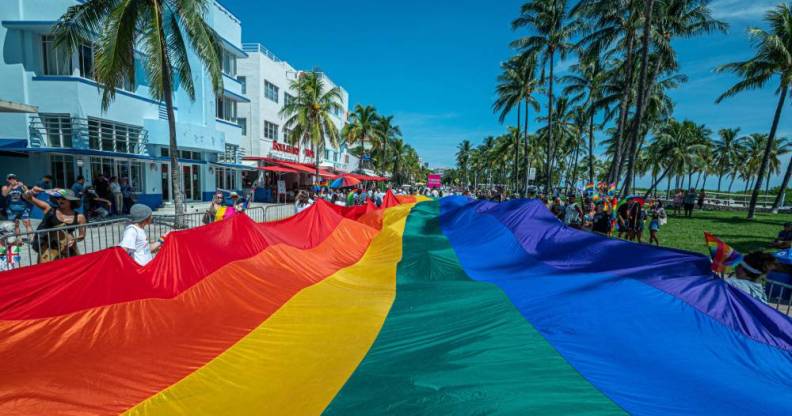Florida’s dangerous and reviled ‘Don’t Say Gay’ bill inches even closer to reality

A rainbow flag flies over Ocean Drive as people participate in the Pride Parade at Miami Beach Pride Festival on 19 September 2021. (Giorgio Viera/AFP via Getty Images)
Florida lawmakers have pushed forward with House Bill 1557, dubbed the “Don’t Say Gay” bill, that limits discussions of LGBT+ identities in schools.
The House Judiciary Committee passed HB 1557 on Thursday (17 February) with a 13-7 vote, according to local outlet WINK News.
HB 1557 and its companion bill in the Florida Senate, SB 1834, have been slammed by LGBT+ rights advocates as “dangerous” for seeking to prohibit discussions on gender identity and sexual orientation in schools.
When the bill was first filed, HB 1557 said it would ban schools from encouraging classroom discussion about LGBT+ people and identities in “primary grade levels or in a manner that is not age-appropriate or developmentally appropriate for students”.
The bill’s wording has since been tweaked. It now prohibits “classroom instruction” by school officials or third parties on sexual orientation or gender identity for children in “kindergarten through grade 3”.
But it also ties in the definition of “not age-appropriate or developmentally appropriate” to state standards.
Representative Joe Harding, the sponsor of the bill, hoped the newly worded bill would clear up any confusion about the vague phrasing in the original text, Tampa Bay Times reported.
“I want folks that oppose the bill to be really clear on what they’re actually opposing,” Harding said. “I want them to go on record to say it’s OK for a six-year-old to have one identity in school and one at home because the school encourages that kind of behaviour.”
According to the Tampa Bay Times, the full House could vote on HB 1557 as early as next week.
But LGBT+ advocates and families believe the ‘Don’t Say Gay’ bill will harm queer youth in Florida
Dalaina May, whose son organised a rally against the bill, said she didn’t need the changes as making a huge difference as it will still compel schools not to discuss LGBT+ issues.
“You said primary grades… now it says K-3,” May said. “What’s the difference?”
Elizabeth Smock, a parent of a trans son and a University of Central Florida administrator, sarcastically called the bill “Tallahassee at its best”.
“Can we just obfuscate a little bit so we can pretend we’re being good to people?” Smock added.
Ryan Thoreson, a researcher on the Human Rights Watch’s lesbian, gay, bisexual and transgender rights programme, declared that the proposed legislation is moving Florida “in the wrong direction”.
He added that parents in Florida could “sue their child’s school for compensation for alleged harm if they believe those discussions have occurred”.
“The likely outcome of the bill would be to deter teachers from addressing these issues and to chill open discussions and support for [LGBT+] students,” Thoreson said.
President Joe Biden and the White House have also weighed in on the controversial legislation.
Biden promised in a statement on Twitter that his administration would fight the “hateful bill” to preserve the “protections and safety” the LGBT+ community deserves.
“I want every member of the LGBTQI+ community – especially the kids who will be impacted by this hateful bill – to know that you are loved and accepted just as you are,” Biden wrote.
“I have your back, and my administration will continue to fight for the protections and safety you deserve.”
The White House also tweeted that “conservative politicians” in Florida had pushed forward a bill “designed to attack LGBTQI+ kids”.

